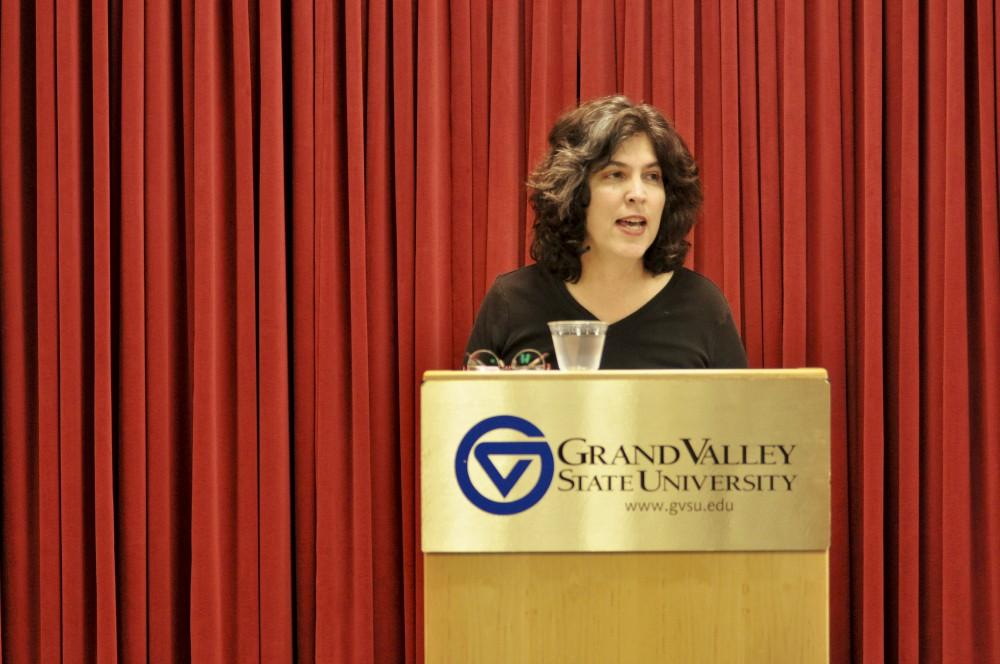Prize-winning writer lectures on how place defines person

Cuban-American fiction writer, Achy Obejas speaks during the Professionals of Color event
Oct 17, 2010
Achy Obejas, a Cuban-American author and Pulitzer Prize-winning journalist, posed questions of identity to almost 100 people in “Identity and Dislocation” at 4 p.m. on Thursday in the Kirkhof Center as part of a lecture series titled “Professionals of Color.”
Obejas said a discussion of identity might seem to be a leisurely subject, but it is actually an essential topic to understand how to view the self and how others view that self.
“I am human by birth, Jewish by choice, Latina by default,” she said.
However, these definitions change meaning depending on location and context. Obejas offered the example of a Puerto Rican-American student who identified herself as a Latina, not an American. The student had never been to Puerto Rico – she had been born in the United States – yet she did not call herself an American.
Because the student called herself Puerto Rican, she disassociated herself with the American identity. She did not accept blame for the invasion of Iraq, a product of the United States government and armed forces.
“What does the Puerto Rican invasion of Iraq look like?” Obejas said. “What does the Puerto Rican invasion of any place look like?”
She said in Miami, Mexicans do not exist in the cultural imagination. But in Los Angeles, the exact opposite is true.
“Who we are changes with the place and the politics in play,” Obejas said.
Obejas said she went to a Hawaiian university as a visiting writer and, for the first time in her life, was considered white, not Latina. Because the subject of race is taboo in Hawaii, Obejas opened the topic for discussion by picking on stereotypes.
She said Cubans are greedy capitalists, but the Hawaiian students did not understand. In their frame of reference, Hispanics made up about 3 percent of the population and fell into two categories. The conquerors got credit for introducing cowboys and a specific pastry to the islands. The conquered were Puerto Ricans, associated in Hawaii with modest and hard-working individuals.
The students assumed Obejas fell into the second category as some a Puerto Rican.
“We tend not to like stereotypes, but only if they’re negative,” Obejas said. “Our principle responsibility is to tell the truth about our complex lives, to defy and confirm stereotypes.”
Kim Ranger, arts and humanities librarian, sat in the front row at the event and said the Obejas’ lecture was “fantastic.”
In particular, Obejas’ final anecdote about a disagreement between two Puerto Ricans – a doctor from Germany and a janitor from New York – sent Ranger a message about identity.
“Race and privilege really are just subjective,” Ranger said.
The event was part of a lecture series, Professionals of Color, hosted by Grand Valley State University’s Office of Multicultural Affairs.
The lecture series invites Hispanic, African American, Asian and Native American speakers.
“On a campus like GVSU, a lot of the professors are white,” said Bobby Springer, associate director of the Office of Multicultural Affairs, “So it’s important for students to see a variety of different people giving these lectures.”
Springer added students can look to the speakers in the Professionals of Color lecture series as role models as opposed to the people of color shown in the media, sometimes the only models an audience otherwise knows.
The next Professionals of Color lecture will feature professional baseball player and ESPN analyst Doug Glanville at 6 p.m. on Nov. 4 in the Loosemore Auditorium.






















